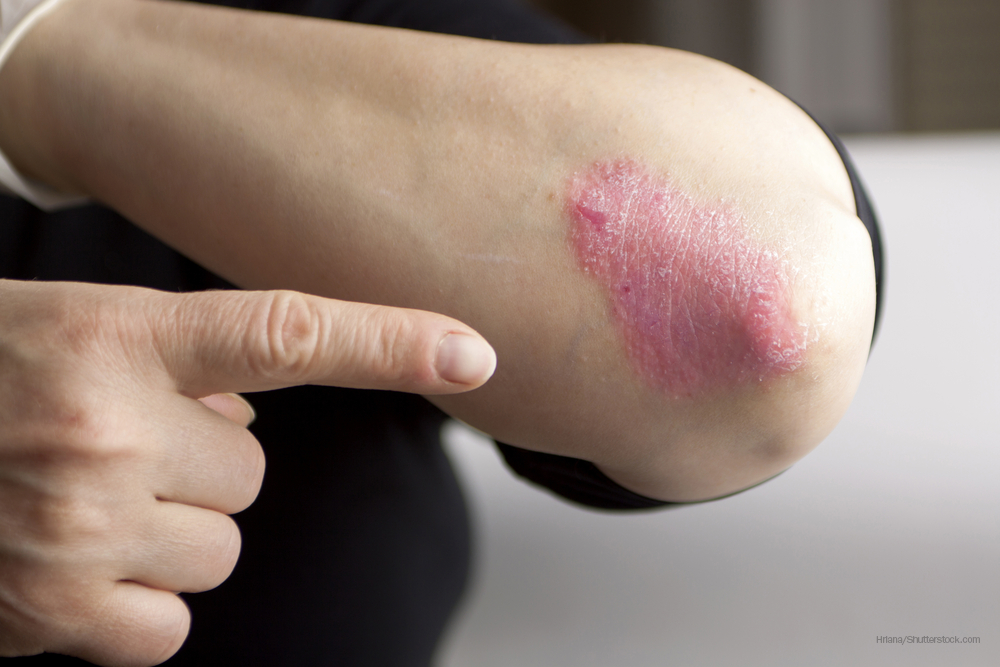- Case-Based Roundtable
- General Dermatology
- Eczema
- Chronic Hand Eczema
- Alopecia
- Aesthetics
- Vitiligo
- COVID-19
- Actinic Keratosis
- Precision Medicine and Biologics
- Rare Disease
- Wound Care
- Rosacea
- Psoriasis
- Psoriatic Arthritis
- Atopic Dermatitis
- Melasma
- NP and PA
- Skin Cancer
- Hidradenitis Suppurativa
- Drug Watch
- Pigmentary Disorders
- Acne
- Pediatric Dermatology
- Practice Management
- Prurigo Nodularis
- Buy-and-Bill
Article
Bimekizumab offers hope for skin clearance in psoriasis
Author(s):
Newly published results from a phase 3 study demonstrate the superiority of bimekizumab over adalimumab for plaque psoriasis.

A new hope for plaque psoriasis patients is on the horizon, suggests newly published phase 3 results from a study conducted by UCB.
RELATED: Promising treatments in the pipeline for psoriasis
The Dec. 6 results are a part of the BE SURE study, which is an active-controlled and dose-blind maintenance study comparing the effectiveness of UCB’s IL-17A and IL-17F inhibitor bimekizumab to TNF inhibitor adalimumab (Humira, AbbVie).
The study monitored skin clearance in 478 participants with moderate-to-severe plaque psoriasis and a minimum of 10% of affected body surface, an IGA score equal or greater than three on a five-point scale and a minimum PASI of 12.
Following optimistic results from two previous bimekizumab studies, BE VIVID and BE READY, at week 16 the BE SURE study showcased a 90% improvement in the Psoriasis Area and Severity Index (PASI) and Investigator Global Assessment (IGA) response of clear or almost clear - at least a 2-category jump from the baseline.
“UCB is committed to addressing the critical unmet needs of adult patients with moderate-to-severe plaque psoriasis, particularly complete skin clearance. Our phase 3 studies have shown that bimekizumab has the potential to make a meaningful difference for these patients," says Iris Loew-Friedrich, head of drug development and chief medical officer for UCB.
The study also met its secondary endpoints, which saw total skin clearance by weeks 16 and 24 (PASI 100) compared to adalimumab. Moreover, bimekizumab proved to have a faster response rate than adalimumab by reaching PASI 75 at week 4.
Once the dose-blind maintenance period began after week 24, the study reports when bimekizumab was utilized there were consistent high levels of skin clearance through week 56.
READ MORE: New biologics target a number of dermatoses
"Active-controlled trials are a key way to inform our clinical understanding and decision making in psoriasis. The results of BE SURE confirmed the superiority of bimekizumab to a widely used TNF inhibitor in psoriasis and further demonstrated the important role of selectively targeting IL-17A and IL-17F," says lead investigator Prof. Kristian Reich, M.D., Ph.D., Center for Translational Research in Inflammatory Skin Diseases, Institute for Health Services Research in Dermatology and Nursing, University Medical Center Hamburg-Eppendorf and Skinflammation Center, Hamburg, Germany.
Despite bimekizumab’s consistent data denoting its safety, the drug’s efficacy and safety has not yet been approved by any worldwide regulatory authority.
The full results will be presented at a scientific congress in 2020 following the completion of the study in March.





